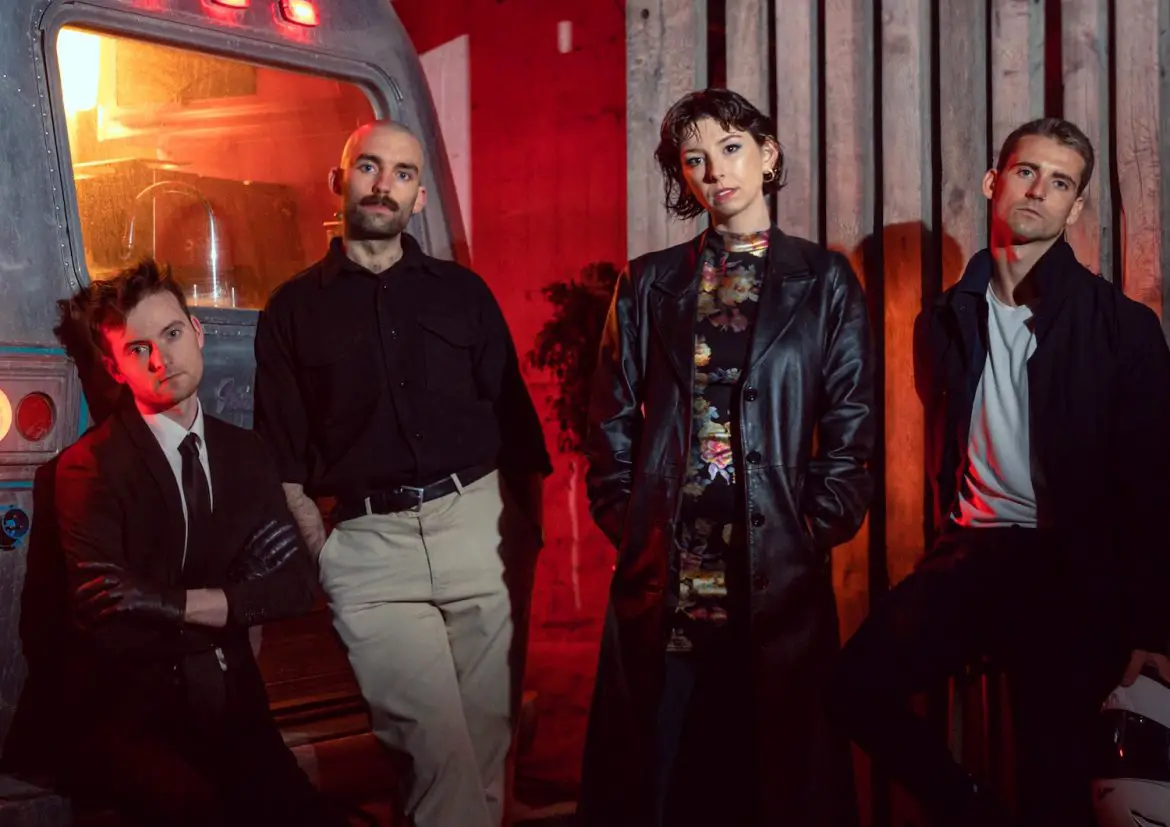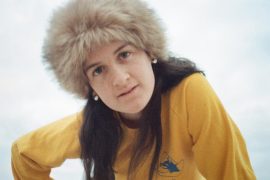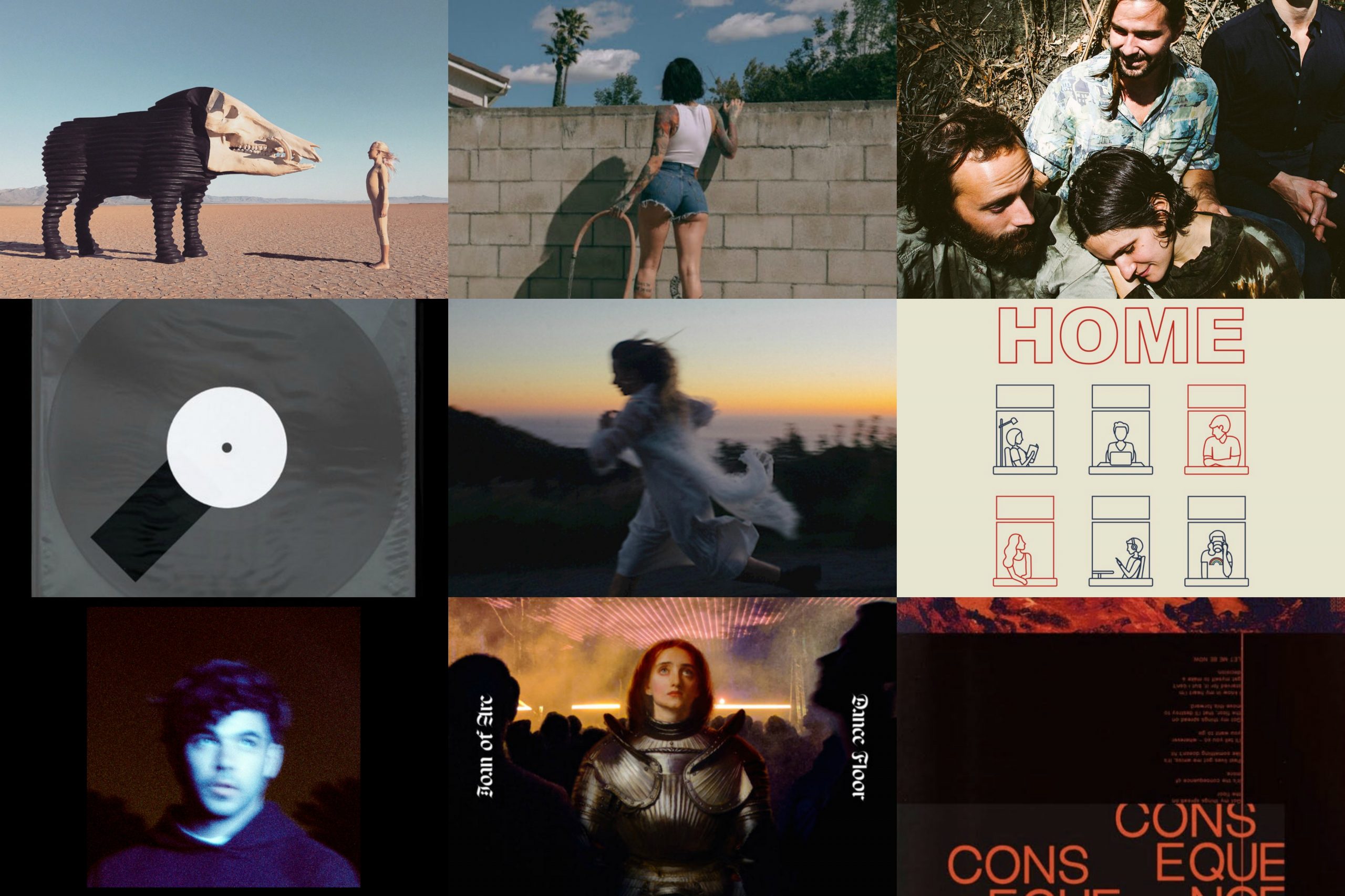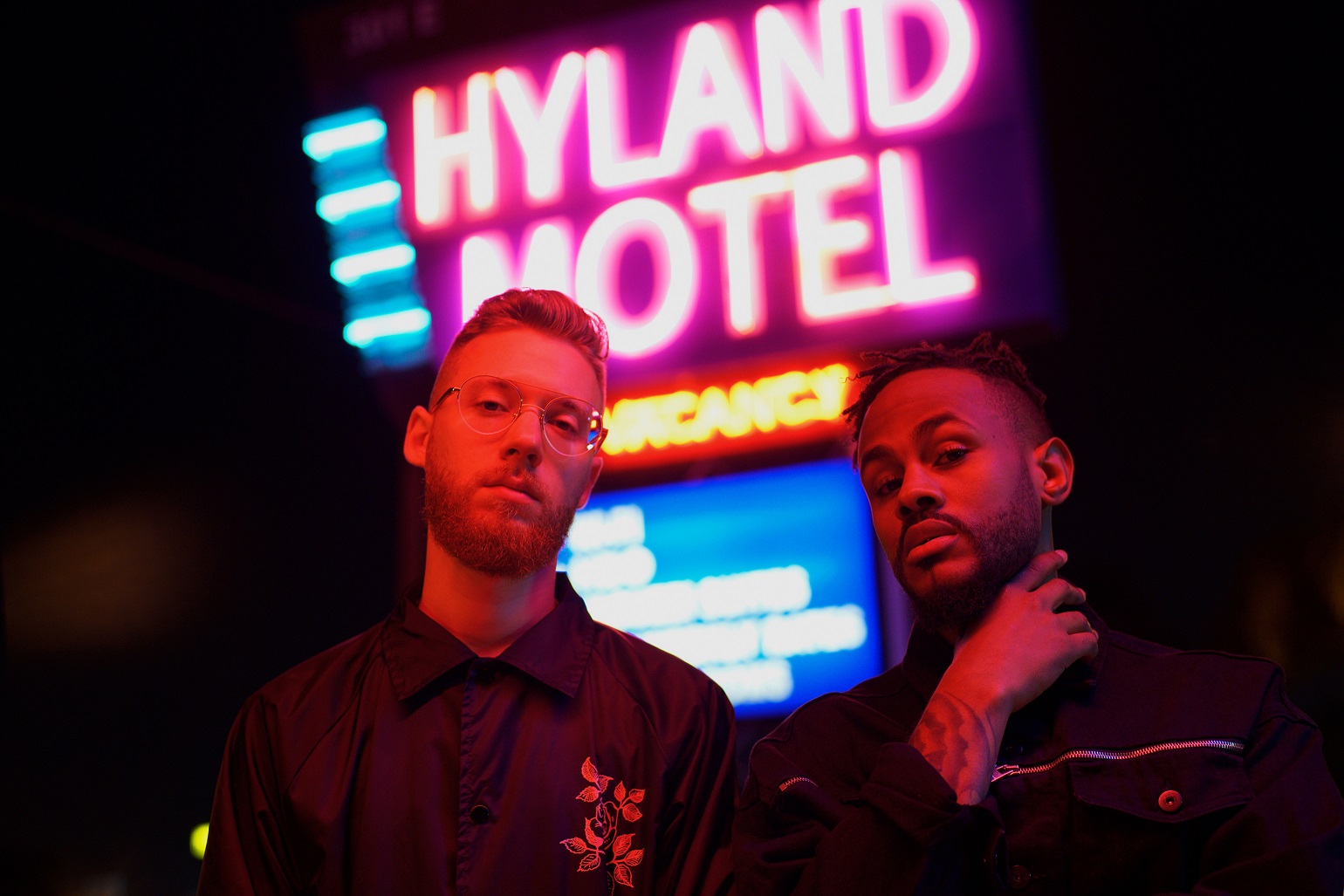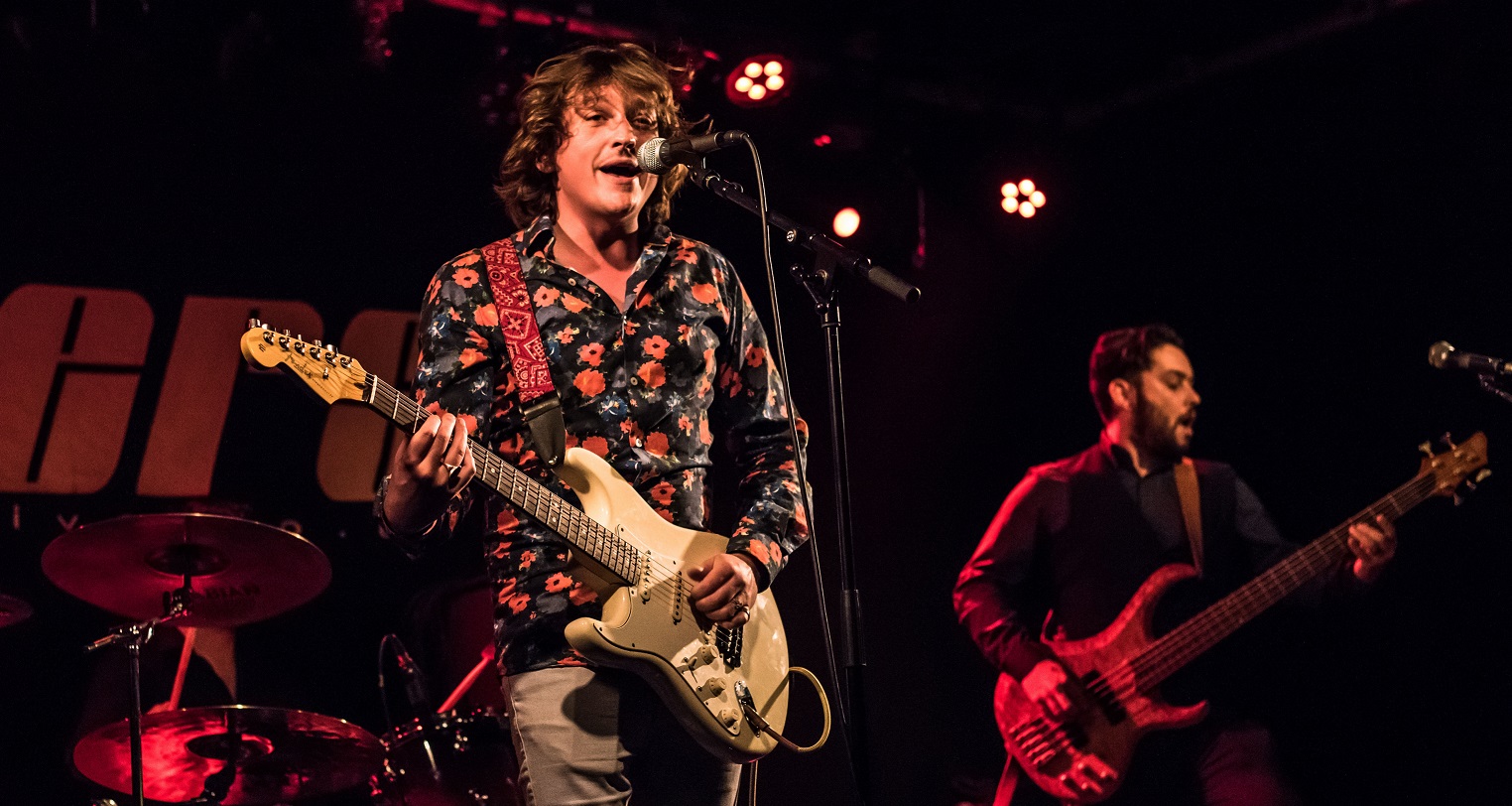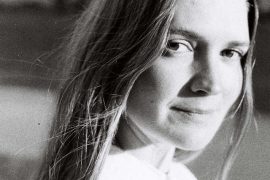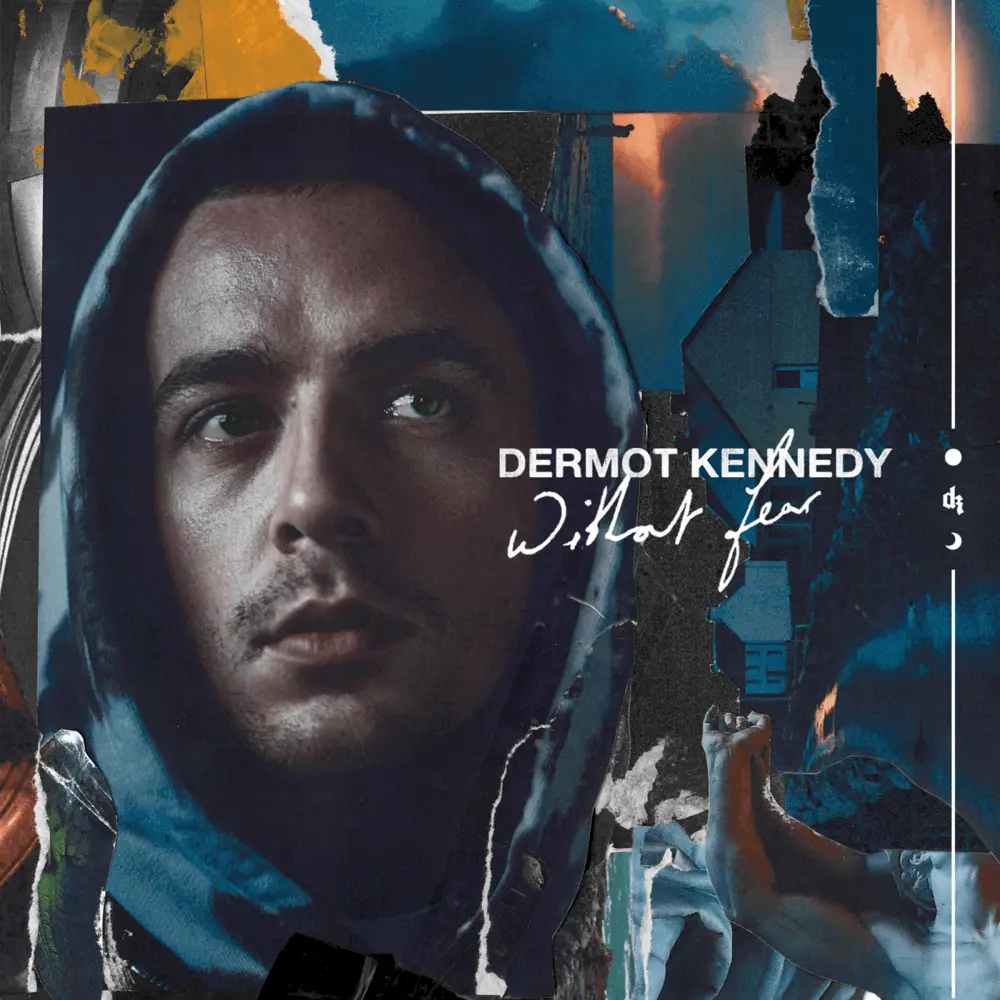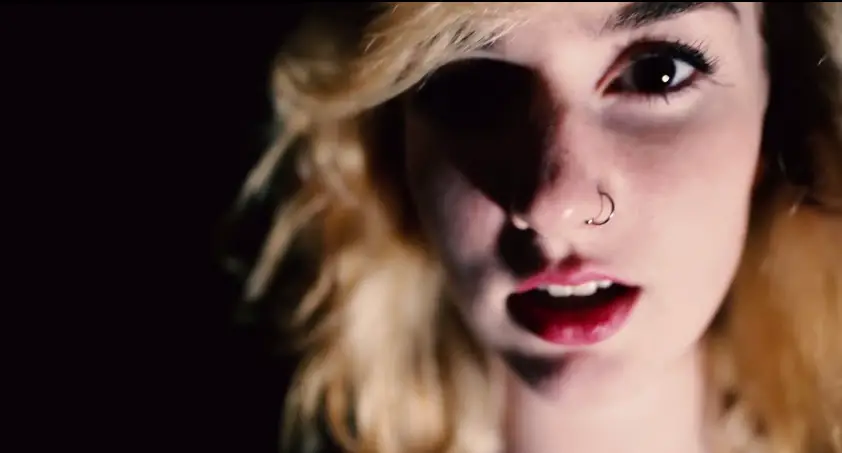Intimate and existential, Soda Blonde’s soul-stirring debut album ‘Small Talk’ is a record of visceral, vulnerable self-expression manifested through beautiful pop music.
Stream: ‘Small Talk’ – Soda Blonde
It takes everything to begin again…
Freedom; nostalgia; authenticity; catharsis; evolution. Soda Blonde’s debut album represents so much more than a fresh start or a new beginning; it’s an inner reckoning with the self – with time’s change; with the past, present, and future. After spending the past two years establishing their predominance as an artist-to-watch, the Irish alt-pop band have delivered an LP that seamlessly marries meaning and substance with irresistibly catchy melodies and warm, cinematic sound. Intimate and existential, Small Talk is a record of visceral, vulnerable self-expression manifested through beautiful pop music. It’s a heartfelt and soul-stirring journey into the depths of the self: Coming-of-age tropes of young adulthood and life in one’s 20s come to bear through powerful moments of self-discovery, as Soda Blonde confront who we are, who we once were, and who we want(ed) to be.

Have you seen my pockets?
Get with the program
Everything’s been slipping
Straight out of my hands
It takes everything to begin again
Am i what i say i am?
Or do they define me?
I was making it by hand
Now it’s built in your factories
It costs you nothing
To remark like that
About all i have
This tiny tiny tiny darkness
In everyone that you meet
This tiny tiny tiny likeness
It makes us all enemies
Released July 9, 2021 via Velveteen Records, Small Talk is an emotional rollercoaster and a breathtaking delight. Soda Blonde’s debut album arrives this summer in the wake of their first two EPs – 2019’s Terrible Hands and 2020’s isolation • content – which helped to not only introduce the band, but also to showcase their talent for making wondrous, catchy, substantive music. In covering the band’s isolation • content EP – which was inspired by, and made during Dublin’s first COVID-19 lockdown – Atwood Magazine praised them for creating “a breathtakingly beautiful, timeless soundtrack to separation and disconnect, love and longing, heartache and hope.”
“It speaks to and for the spirit of the present day – the feverish emotions spawning from our collective yet individual isolation. It’s an EP full of despair, anguish, and uncertainty – yet every song is nonetheless full of warmth, humanity, understanding, and hope. With songs that speak so deeply to what’s going on within, Soda Blonde help us connect during the most disconnected time in recent history. isolation • content is raw and uninhibited, a product of its time – and what’s perhaps most stunning about its four tracks is that they will resonate with us long after this pandemic has run its due course. While this EP would not exist without the pandemic and lockdown, it’s not the lockdown, but the feelings it has engendered, that fuel Soda Blonde’s music.”
Already the alt-pop pride of their local Dublin scene, the five-piece of Faye O’Rourke, Adam O’Regan, Donagh Seaver O’Leary, and Dylan Lynch have been bound for greatness from the beginning. The longtime best friends formed Soda Blonde following the dissolution of their former band (the critically acclaimed Little Green Cars), coming into their new project with nearly a decade’s worth of experience and the drive to soldier on and be the biggest band in the world. Small Talk is in so many ways the ending of a defining, exciting, and yet turbulent chapter in their collective and individual lives – and to think, they’re only just getting started.
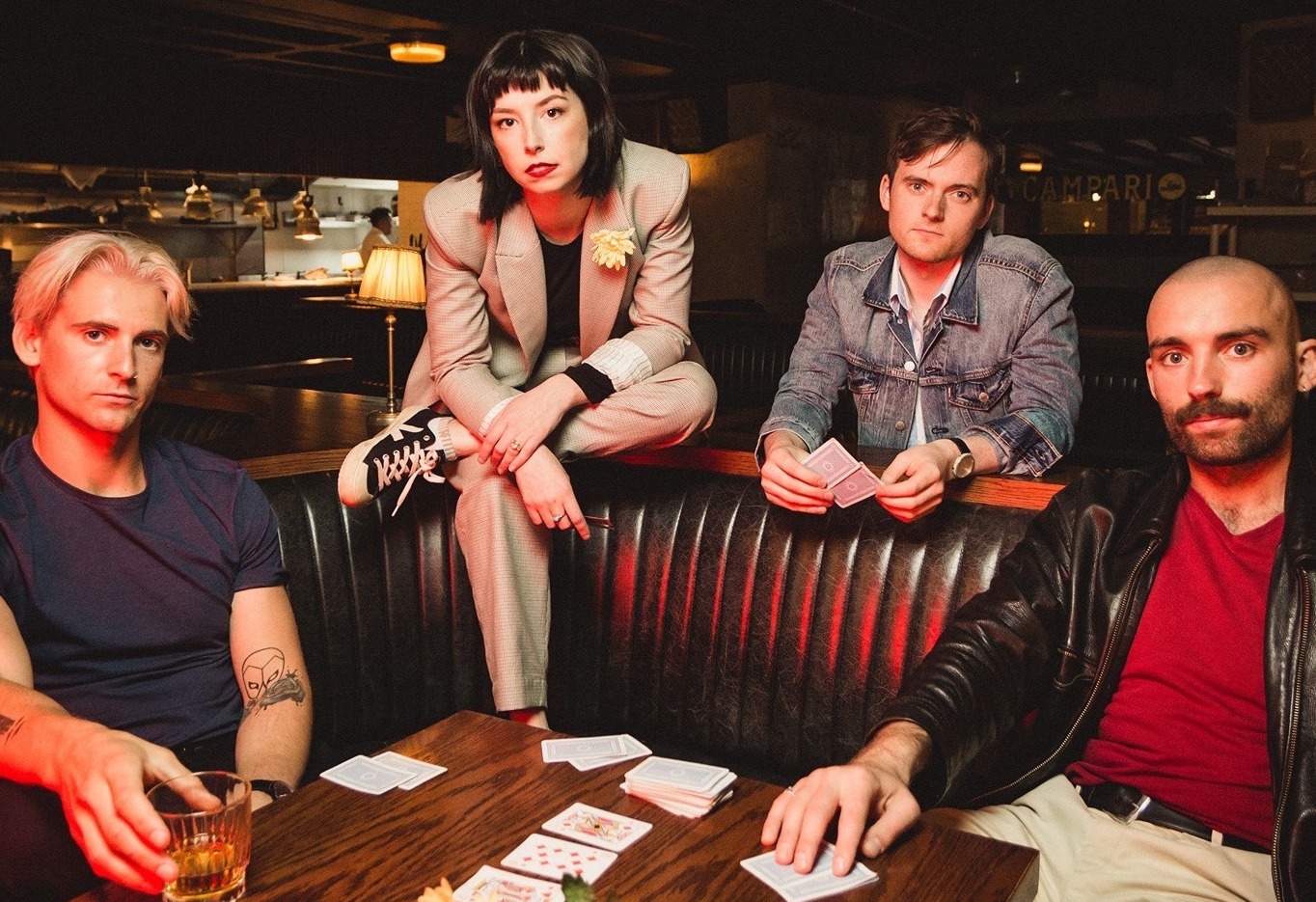
No one captures a world of raw emotion quite as beautifully, nor as viscerally, as Soda Blonde.
“The album is about all of us, and it does chronicle our 20s in a big way,” lead singer and songwriter Faye O’Rourke tells Atwood Magazine. “Personally, I know I’m gonna feel a huge amount of closure from releasing this record because I’m addressing so much stuff, and I’m also saying goodbye to a lot of stuff… It’s been all kinds of things, but it has been hard. We’ve all grown so much, and even talking about the album or trying to summarize it is hard. That’s why Small Talk seemed like such a fitting title, because it reduces it to that: It’s kind of about everything and nothing, but yeah, I feel like we’re all defined by this record.”
I think we wanted to make an album that we collectively had not compromised on at all, that there was nothing that any of us would skip, that had every single piece of each of us in there, that explored every option.
“It was painstaking – everything was so unbelievably considered,” O’Rourke adds. “I’ve said my lyrics just dwell within this sonic space that’s nostalgic, but it also feels like it’s a part of the future. It was freedom. I felt like I was living for other people, and I wanted to live for myself, and I think we all wanted to live our own lives and live for ourselves. And that’s why I say the record’s so incredibly hard to talk about ’cause there’s so much in it. I feel like it saved me – I actually feel like the record has saved me in a big way. And I guess the vision, it’s about surviving and thriving.”

From the album’s stirring opening tracks “Tiny Darkness” and “The Dark Trapeze” to intimate outpourings like “Terrible Hands” and “Holy Roses,” to the smoldering raw emotion of title track “Small Talk” and beyond, Soda Blonde’s debut cuts to the core and leaves listeners shaken, hungry for more. The band close with the glamor and seduction of their 2020 single “Love Me World,” followed by an intense finale with the impassioned upheaval “Choices.”
“It was the first one where we wrote something that felt kind of jubilant, and it was an energy that we weren’t really familiar with,” Adam O’Regan explains. “Like in Little Green Cars while the music was very introverted, and a little bit sombre, or whatever. I remember, when we wrote this song, we went that direction first with it. Faye played it to us on the guitar and our first instinct was to really embellish it, mess it around. And then, at a certain point we were like, ‘Why don’t we go and do a bit of a Smith’s thing on the drums, and go a bit like Johnny Marr or whatever,‘ and ‘why don’t we do this big string patch?‘ Then we heard Faye like we’d never heard Faye before, and the emotional power of it was like, ‘Oh my God, this is pretty addictive, let’s do this again!‘ And, I feel like that was maybe the birth of Soda Blonde, somewhere around that moment.”
You’re nervous
Cause i’m angry again
And it’s my body and i’ll cry if i want to
But don’t make this out to be like that
You’re pulling
I’m pulling right back
Everything i’m saying’s right over your head
But you won’t make me push for something that’s dead
Maybe you have everything i wanted
So maybe i should just fall into line
Maybe i should let you make my choices
Or maybe you should go to hell and write
Me a love song
Soda Blonde have a compelling allure that is all their own – an energy that shines bold and bright.
Through honest lyricism and immersive, expressive music, they create a world with every song. Atwood Magazine dove into the throes of Small Talk with the band, discussing the ins and outs of their debut album, the experience of “starting over,” making meaningful pop music, and more.
Soda Blonde are a one-of-a-kind band, and their first LP is a singular album of beauty, depth, and passion.
Small Talk is out now.
the record’s kind of, in a way, it’s trying to sort of derive some kind of love for myself by speaking as honestly as I can about my own shortcomings and also being in a world where… I don’t know, everybody seems like they’re quite didactic and they know what they’re talking about. I’m 29 and I still really don’t know.
— —
:: stream/purchase Small Talk here ::
A CONVERSATION WITH SODA BLONDE

Atwood Magazine: Hey all, I am so excited to finally discuss Small Talk! It's been a journey getting here. Can you talk to me about what it feels like to be releasing your “second” debut album?
Faye O’Rourke: Well, I think it’s gonna be the most cathartic thing really in the world. Not only because… I guess, these songs have been in the making for the last three, four years, but we’re kind of coming out the other end of a pandemic as well. So for all those reasons, it’s gonna feel pretty damn good.
Adam O’Regan: Yeah, yeah. The journey of these past years has been incredible, and not least because Soda Blonde came out of a long, long writing process that kind of originally started with our last project. We had written and written and written – as we always do; you’re not really thinking of exactly what it is you’re doing. You’re just kind of writing, seeing where the music takes you. And over a period of about two or three years, it got to a point that we started to crossover into a different threshold, and Soda Blonde was born out of that. When the last thing ended and we kind took a step into this new thing, there was really no certainty as to whether it was going to work, or whether people were going to accept it or embrace it – and they have! And it seems like we’re finding our audience. Every day the listeners are going up and people are responding to the music so well. It’s really, really encouraging. We’re very excited at this moment in time.
Faye O’Rourke: The album is about all of us, and it does chronicle our 20s in a big way. Personally, I know I’m gonna feel a huge amount of closure from releasing this record because I’m addressing so much stuff, and I’m also saying goodbye to a lot of stuff. I feel like this is gonna be the doorway to a new beginning, and… It’s been all kinds of things, but it has been hard. We’ve all grown so much and I think it’s really hard – even talking about the album or trying to summarize it is hard. And that’s why Small Talk seemed like such a fitting title, because it reduces it to that.
It’s kind of about everything and nothing, but yeah, I feel like we’re all defined by this record. The record is who we are, and I think finishing one project and then being like, “Do we wanna do this again?” We’ve been defined by this – being in a band has been all of our identities for over 10 years, for probably 15 years now. When you’re 13, you’re in a band, it’s cool. And then when you’re 20 and you’re in a band it means something else. When you’re 25 and you’re in a band, it means something else. But to be where we are now in a band, [chuckle] it’s a pretty incredible thing. And I still want to be in a band. [laughs]
I know I’m gonna feel a huge amount of closure from releasing this record because I’m addressing so much stuff, and I’m also saying goodbye to a lot of stuff. I feel like this is gonna be the doorway to a new beginning.
You preceded this with your Terrible Hands EP and then the surprise isolation • content EP. What, for you, is the difference between those two EPs and this full-length project?
Faye O’Rourke: God. Well, they’re all part of their own kind of little ecosystems, almost. The album has always been there, and we’ve always had those songs. It’s not like they’re the best of the bunch, but they belong together. The album has a journey and it has a beginning, middle, and a conclusion. I think that we’re ready to tell that story now, whereas isolation • content is something that came out of pure experimentation, really. That was like, “We need to stay sane. Let’s see what we can do.” And there’s a real purity in that, because it was really capturing the moment. It wasn’t like working on one song for three months; it was three songs written in two weeks and arranged and released! That’s incredible, and a very different way of doing things.
Then I guess the Terrible Hands EP was us really finding our feet and with that, even the aesthetic, we were kind of living that lounge singer thing, which for me was like living the reality – because you’re kind of going back to basics again and kind of, “What do I have to do to make you love me?” Like, “Do I need to bring the sexuality into it? What does it mean to be a pop star? What does it mean to be making music? What do people expect?” Doing that literally for that first EP was amazing, because I think personally we’d been through a lot as a band, and that was a real test of our confidence and kind of forced me, in particular, to put on a pair of heels and a dress, get in front of people and be really vulnerable. It forced a confidence that wasn’t there. I think it’s been an incredible journey, and now we’ve arrived at the point where I think we know what Soda Blonde is. We know what our relationship is with each other, and we know the music that we want to make, so we’re ready to release these songs.
Adam O’Regan: If I can just speak to the isolation • content EP, to me, that is a really important moment in all of this because as I said, a lot of this music was born out of a previous project – or a writing session for a previous project. And it became its own thing! But isolation • content was the first project that we embarked on together as officially, “We’re Soda Blonde,” and these songs are coming out of nowhere, and we challenged ourselves like, “Can we write a song apart?” ‘Cause we’re used to being in a room together. We’re used to playing with drums and bass and guitar and keyboards and whatever. And “Can we do this? Can we make something of quality apart in these conditions?” And then we said “Well, fuck it. Let’s take it one bit further. Let’s try and make an EP like a proper body of work,” and we did that. And we did that with flying colors, in my opinion. We’re all really, really proud of that work, but that is the moment where it’s like, “Okay, we’re Soda Blonde now, this is our Soda Blonde voice officially.”
I listen to many of those tracks, like ''Motion'' and ''June,'' regularly. They are all such incredible pieces of your journey, and also wonderfully melodic songs with a lot of meaning. One of the things I've long loved about your band is that you don't shy away from packing your music with substance, but you also make it insatiably catchy. It's often hard to write a meaningful pop song, and yet it seems like it's second nature to you.
Faye O’Rourke: Adam was talking about this earlier – it can be quite frustrating for the guys, because I don’t often let go of a song until I know that it’s complete. Lyrically it has a conclusion or like I’ve started in one place, and I feel like I’ve learned something or I’ve concluded what I set out to do. So that can be kind of frustrating because I’m playing little snippets of things and the guys are like, “Oh, come on. Can we just do a verse and a chorus?” And I’m like, “No, I have to figure out what the fuck this means first.” I think the songs always have such an emotional depth, because that’s the seed. The seed is that, always. They kind of always start from that point, and then they take on new shape and meaning as they go on. That’s only the beginning of the story and as I said, that’s the great thing about being in a band.
Adam O’Regan: That is the key thing, that the heart is always there in Faye’s lyric, but the vehicle that we’re all kind of so taken by, and the thing that we use to kind of communicate it is essentially through the pop music sort of vehicle. And pop can sometimes be a bit of a dirty word, like when you say pop, sometimes it makes it feel like it’s throwaway or it makes it feel like it’s kind of effortless or meaningless, or whatever. And certainly in our last band, there was a little bit of that kind of inner conflict where we were labeled as a “new folk” or a folk band, and when you’re in that world, there’s a little bit of a sort of… You have to be authentic or you have to be fit in with this kind of… I don’t know. Something about it is a little bit contrived at certain moments. For me, pop music, when it’s doing its job right, is just the most direct way to communicate a message. It’s like, distill it down to three and a half minutes. Make the chorus hit you. Make the verse say what it needs to say, and then it should get right into your heart and it should speak to you in a really dynamic way. And that process is not easy. It’s not easy to do it right, but it’s something that we are really enjoying exploring. We’re (understandably) trying to make great pop music right now.
Faye O’Rourke: Yeah. I think without compromising, I think that’s the important thing – without compromise. It’s funny, because I think it’s always hard to categorize your music, and pop’s the easiest thing, just because it’s encompassed so many things and it’s had such an evolution over so long. That’s something that’s kind of evolved and will be evolving, whereas when you think about maybe other genres, they kind of… I don’t know. They kind of can remain in a certain place. Whereas, I guess, pop music for me just means possibilities.
For me, pop music, when it’s doing its job right, is just the most direct way to communicate a message. It’s like, distill it down to three and a half minutes. Make the chorus hit you. Make the verse say what it needs to say, and then it should get right into your heart and it should speak to you in a really dynamic way.
This is the third full-length album that the four of you have made together, right? What, if anything, were some of the differences between Absolute Zero, Ephemera, and this record? Furthermore, what's it like to make a pop album?
Donagh Seaver O’Leary: Yeah, I feel like what was really exciting about making this album was that it was the first time we were pure DIY. There was no one else involved in the process. And it’s funny when you think… If you’re thinking about pop is kind of pristine or there’s a kind of cut-the-fat off things. I feel like we were in the bunker making that album. We were in this small little cottage beside a train. We had to wait for the trains to go by until we actually finished recording and it was just so… I really felt… And it was so much fun because we had so much that we wanted to do and say, and there’s probably these built up frustrations of when the previous project ends, you feel like it might have been happening for quite a long time, in many ways. The difference, I think for me, personally, is that it was just a really cathartic, this is really fun, “back to basics” stuff. I feel like we got really creative by the limitations that we had.

It was just a really cathartic, this is really fun, “back to basics” stuff. I feel like we got really creative by the limitations that we had.
Faye, you talked about being ready to tell the album’s story now. What was the band's collective vision going into this record, and did that change over the course of recording these songs?
Faye O’Rourke: I think the vision was just we’ve always served songs, we’ve never gone, “We wanna use this set of instruments and we wanna make a record that sounds like this.” And I think we’ve been saying that even since we were in Little Green Cars. Always serve the song. I think we wanted to make an album that we collectively had not compromised on at all, that there was nothing that any of us would skip, that had every single piece of each of us in there, that explored every option. It was painstaking – everything was so unbelievably considered. I’ve said my lyrics just dwell within this sonic space that’s nostalgic, but it also feels like it’s a part of the future. There’s sounds in there that I wasn’t familiar with, we were coming up with things, even in “Swimming,” how we were creating some of those beats and things like that. It was freedom. I think finishing one project was like… I felt like I was living for other people, and I wanted to live for myself. And I think we all wanted to live our own lives and live for ourselves. And that’s why I say the record’s so incredibly hard to talk about ’cause there’s so much in it. I feel like it saved me. I actually feel like the record has saved me in a big way. And I guess the vision, it’s about surviving and thriving.
A lot of this record... It's a very dark album, at least thematically. I feel like you poured a lot of anxieties and... heavy life events into this music. What was going on in your worlds that inspired the world you live in music?
Faye O’Rourke: I guess there’s lots of things that I’m touching on, and I think they’re hard things to talk about. They’re easier to write about than to talk about it. And like I was kinda going through a period where I was very dependent on drinking and I was trying to derive meaning from all the time I felt like I had been out using drink and partying. It was like I was in a very dark place. And it’s hard to admit that, I think. ‘Cause I’ve always been a very social person but like I was really struggling and I kinda lost a lot of motivation. I’d also kind of like, I’d very much felt like I had failed my family. I was seeing other people come up and have jobs and niches, and I was very, very broke. I still am. [chuckle] And it’s kind of like… Also, it’s kind of just about, from a female perspective, having gone through my life as a teenager solely kind of really seeking the validation of men. That was a huge motivator for me. Like, my life has always been motivated by sort of connecting, and being with people, and my work has fallen to the wayside because I’ve kind of just tried to be loved. I’ve just wanted people to like me, I’ve wanted people to love me.
So the record’s kind of, in a way, it’s trying to sort of derive some kind of love for myself by speaking as honestly as I can about my own shortcomings and also being in a world where… I don’t know, everybody seems like they’re quite didactic and they know what they’re talking about. I’m 29 and I still really don’t know. And I guess that whole, as I said, trying to find self-validation and coming into this new age where women are empowered. And I feel like part of me still has one foot in the past that’s still kind of like, “I know where I came from, but there’s this expectancy to be… Even in a band, I kinda feel like people look at me sometimes and go like, “Oh, you have to do everything because you’re the woman.” And if you don’t carry that role, it’s like, “Yeah, well, the guys do everything, she’s not the one.” And it’s like, “We’re a band.” We’re a band, and that’s the most important thing.
Dylan, Donagh, and Adam, how do you see your own responsibilities working with Faye as equal members in the band?
Dylan Lynch: I wouldn’t necessarily phrase it as a responsibility because being in a band is, you’re in a band. That’s the beauty of it, and that’s the kind of thing that, after all of us emerging and becoming Soda Blonde, that was more solid than ever. Everything fell apart, everything crumbled, and we emerged as a unit. I don’t consider those things.
It's the outside that places these expectations and these thoughts, but inside it's just four best friends.
Adam O’Regan: Yeah, exactly, just trying to support each other and trying to figure out the hoops.
Faye O’Rourke: As I said, the weightiness of the content is just something that lives within something that’s bigger. That’s why it’s such a pleasure and a privilege to be in a band, because everybody else gets inserted in there too.
Well you definitely make it look exciting. Let's talk about these songs. We turn this record, on and immediately we hear “Tiny Darkness.” Can you talk to me about why you open with this song?
Faye O’Rourke: It’s a bit of a no-brainer really…
Adam O’Regan: It just felt like an opener – the right opener, I think!
Faye O’Rourke: Well, “It takes everything to begin again,” I think says it all. I don’t even need to explain that. That was like, “Yeah, that’s what we’re doing here.” It does take everything to begin again, and we are doing that. I think it just does the job.
You get very personal on “The Dark Trapeze.” I think the lyric is, “I’m a seed, I’m the dark trapeze, I’m an advertisement, I’m the words you start a fight with.”
Faye O’Rourke: It’s just, “I’m a seed.” It was just coming from the idea of… That song was like, again, coming back to the idea of being everything and nothing at one time. I was just in a place where… Me and Donagh talk about this sometimes, we’re just like, “do you know what’s going on?” And, I’m like, “I don’t fucking know what’s going on.” I’m trying to make sense of things. I think we’re all seekers of the truth, you know? I think as four people, we all have very different opinions, which is what makes us great. We can have debates, we can have arguments, we’re not all carbon copies of each other that have the same beliefs. We’re soul seekers, searchers, and we want the truth, and I think that song was just about making the point that everything is nothing, and everything is everything.
It's really interesting to see how the record progresses over time, because I feel like, every one of these is its own little upheaval. “In the Heat of the Night,” “Swimming Through the Night,” “Terrible Hands”… And as you get into the album's greater parts, I'm really fascinated by “Try” and “Holy Roses.” Can we talk about those songs?
Faye O’Rourke: “Try”… To be quite personal about it, that I was seeing somebody at the time and I kind of, in some ways… Which is crazy because I didn’t admit it to anyone really, but I maybe felt like there was something missing from that. And I maybe knew that I was fulfilling, or being self-indulgent, in being in that relationship. I don’t know if I was fully able to give, at that point, but it was like… I needed the relationship to be stable at that time. And, it kind of says, “We don’t have to get this right the first time, but I’m gonna try.” It was like, “maybe this isn’t going smoothly, but I’m gonna push on.” And, in the end, it’s kind of, got to get a job, got to go to work. I’ve got to do all these things, I’ve got to have these assets, I’ve got to be this type of person on paper to feel like I fit in in society, and I don’t have any of those. I still don’t. [chuckle] That was one of the older tracks written actually.
Adam O’Regan: I remember we were just thinking about “Hold On, We’re Going Home” by Drake, and we were thinking about the arrangements of that, and something in the beat, whatever. But, yeah when we went to record it for the album, it’s one of those times where we started to really just branch out in terms of… Really indulging some level of musicality. We love albums where there’s intervals and there’s little musical sections that go off on their own tangent. While we were trying to stay true to some sort of… As I say, direct pop sensibility, we really wanted to make an album that had that kind of… Indulge that kind of musical sensibility as well. I remember the last… That kind of outro section of that song, of “Try.” When were you born, Mitch?
'92.
Adam O’Regan: ’92? No way. [everyone shouts]
Are we all the same?
Faye O’Rourke: Yes!
Adam O’Regan: I was just wondering ’cause when I was growing up my older brother used to have a Super Nintendo, and I remember some of my earliest memories of music is Donkey Kong Country, on the Super Nintendo.
Faye O’Rourke: The best game ever.
Adam O’Regan: And the underwater theme of that game, I think it’s called “Aquatic Ambiance,” you can find it on YouTube or whatever. It’s just some of the most beautiful video game music of all time. I kind of tried to rip that off on the outro of “Try.”
Faye O’Rourke: Stop giving away our secret! [laughter]
Paint face, leave home
And i am followed by my soul
It says slow down but i’ve made my mind up
And i don’t need its advice right now
This is what i always do
Will i ever change for you?
We don’t have to get this right the first time
But i’m gonna try
And if we don’t get this right the first time
You wouldn’t mind
That's amazing. And then “Holy Roses” comes along and Faye, you just fly. I love the dichotomy within the mid-section of this record, where there's this chaos going on, seeking control, and you just let loose. It’s a beautiful part of the album, with this sense of letting go.
Faye O’Rourke: Yeah, and it was funny when we finished that one off we were all just nodding at each other, kind of going like, “this is really good.” It’s funny, ’cause initially the chorus was the bridge. I had written the chorus as the bridge, so it was funny ’cause the guys were kind of like, “Why don’t we… ” [chuckle]
Adam O’Regan: It was that moment where it was like the bridge, which is now the chorus, was so euphoric, and catchy. We were getting there with the song but we were kind of thinking, “Okay, what can we do here?” And then, one of us was like, “Yeah, why don’t we just swap it?” Then we all had that moment where… And that’s the magic, and that’s what you want when you make music with people, is that feeling when you’re… You know that you’ve cracked it. And I feel like that was the latest song of that batch as well.
Faye O’Rourke: That was the real kinda like, “I’m getting closure over things, I’m speaking to people I can’t speak to and it’s very direct”. I think sometimes I tend to be a little bit more cryptic with things, but that’s a really direct song and it’s very cathartic, and it means a lot.
And it goes right into, “I Still Have Feelings for You,” which reminds me of the loungey vibes you were talking about on the first EP. It also got me thinking about experimenting with different styles of sounds, because it's this Latin flair to it with the guitars. What was it like, finding these sounds? Pop is a big umbrella. What were you looking for? What guided you along the way musically, stylistically, etc.?
Donagh Seaver O’Leary: I think that was when we were doing “Feelings”… I think Faye and Donagh were somewhere, it was Adam and I… I think we had… Do you remember we had…
Adam O’Regan: Can we tell the story?
Faye O’Rourke: Yes.
Adam O’Regan: So Dylan mentioned earlier on that we are kind of essentially recording in a bunker, and just really like… It was really, “Pull up your bootstraps and jump into the mud” type of thing, and make this happen. Because it was a shed and it was on the DART line, on the tram line next to where… Yeah, we were on a railway line, so every 20 minutes, 15 minutes, the train would go by, and the whole house would rumble. You can actually hear it at the start of the track. You’ll hear a kind of like, a rumble and Faye exhales in exasperation, ’cause she’s like, “What? We go again”, you know?
Faye O’Rourke: ‘Cause the train has ruined the recording.
Adam O’Regan: Also, there was a the lot of takes, as well, at that point. And we… The house, I don’t know whether it was something to do with the earthing in the house or something but, no matter what we did, we couldn’t get an amplifier to be quiet. They were buzzing, like every amp, every guitar would buzz. And there’s this great guitar store in the city that was very gracious. They’re friends of ours, they loaned us an absolutely stunning 1963 Fender Stratocaster, and this beautiful… I can’t remember the name of the amp… Plugged it in, and we set it up, and we start recording. We had Faye under the house recording, and it was really important for us that we try and… Like, this song was all about her vocal, it’s all about the rawness of it. So we had her do… It must have been like a 125 takes over, and over, and over, and over…
Faye O’Rourke: Well, I think a lot of that was due to my shoddy guitar playing as well, but anyway…
Adam O’Regan: Well, we were just trying to find the take, you know? We were trying to be Stanley Kubrick about it. We were just trying to… Where is the moment, you know? And so we did it, and at the end of the day, we kind of felt like, “Alright. Let’s just leave that, and then we’ll come back to it in the morning”. And then the next morning myself and Dylan arrived to the studio earlier, and just decided to just flip the script and go against the whole, “Let’s get the realness and the rawness idea out of it.” We said, “Well, let’s just lay down this beat.” So Dyl kinda lay down his Latin…
Donagh Seaver O’Leary: Well, what happened was, I think… We were messing around with drum machines ’cause you’re kind of thinking, What could we… And then I think I was on… Just sitting on this chair and I had acoustic in front of me and I was like, “What if we did something like this?” And it was like, Oh yeah, I think… And then I think we tried to program in stuff to match it. Then I think you were just like, “Why don’t we just record you playing on the acoustic?”
Adam O’Regan: So Donagh’s doing this Latin thing on the acoustic, and then we’re thinking of like, Air, is always a big reference for us. Their album, ‘Talkie Walkie’ or ‘Moon Safari’ or something like that. So we’re thinking about a lot of those textures. Anyway, Faye came in later in the day, and it’s not often that we kind of like do things without the four of us being present. Hence, we were like, “Listen, Faye. We’ve done a thing. We kinda did a thing” and just…
Faye O’Rourke: I went mental. I went berserk.
Adam O’Regan: She was not happy! We played it to her and she was, like… ‘Cause this song, obviously was very personal to her, and we really just took liberty and went all out in the music. We were just like, “Look. Just, please just try to sing on it. Just sing on it. Just sing on it!” And she’s like, “Fine. Not happy about it!”… More or less.
Faye O’Rourke: I was so angry.
Adam O’Regan: She went in, and she recorded her vocal, and I remember myself and Dylan were just looking at each other going like, “Oh my God. This is fucking great.” And I think she felt it as well. And it was one of those happy moments.
Faye O’Rourke: Yeah. It was all happiness in the end, but it was touch and go there for a while.
Donagh Seaver O’Leary: ‘Cause it’s a good mix of production with the emotion with that. I think that’s actually my favorite song on the album – I love it.

Well, you introduced the album with the title track, “Small Talk.” You mentioned a little bit about why the name of the album is Small Talk. Of course, the song definitely has a very special place on the record.
Faye O’Rourke: “Small Talk” captures the feeling of just trying to fucking wade your way through the bullshit a little bit, and acknowledging your own responsibility within that, and where you stand, and what does your opinion mean. Why is my opinion above anybody elses in this kind of… Yeah, so it just felt like a fitting thing to use with the title track. It’s also a reflection on trying to derive more meaning, and more depth, from life. Just things going by… Maybe that’s my own sensibility as an artist, and maybe that could be perceived as an arrogant one, but I think I’m always trying to insert a little bit more into situations or… And also finding meaning in the mundanity of things and liking that as well. It’s, kind of, flipping the script a little bit. What do you guys feel?
Adam O’Regan: It’s just a jam, you know? Like she said at the start. Sometimes you can talk about these things and that does come. Sometimes like… Not just… It’s a fucking good tune, you know? At the day I think so many of these things can be overthought, and we always, we do like to make sure that there’s enough layers in what we do, that people can bring what they have to the table, and they can take what they want from it, they can apply it to their own life. But at the end of the day we’re trying to make music as well. We want people to move, we want people to sing, we want people to cry or whatever it is.
Faye O’Rourke: Well, I think that’s what’s great about it, is because it has all those things and it has all the turmoil, it has the confusion, it has all those things. Then, you think about somebody listening to it and they probably… They might not even engage with that side of it, do you know what I mean? They’re just responding to the fill, and the chorus, or whatever. For me, those things are intrinsically a part of me and they’re really important, so it is that marriage. That’s why it’s so great because it’s got… It’s complex, but it’s also extremely simple. That’s where the “Small Talk” thing comes in, ’cause you can just reduce it down to… Me even talking about it is like “shut up.” Shut up and play the song.
It's funny because Adam, you're so right about all of that. When somebody asks me to describe a song, I can't find the words for it, but I'm somehow able to write up an essay about a song on a daily basis. I couldn't tell you where that comes from or why that happens, it just is the case. But, that's why it's there when you want it, if you want it.
I think what's pretty cool about this record, is it's got a little bit of everything. “Champion Of My Time” is really interesting. It reminds me of those smoldering, coming-of-age anthems you used to hear at the end of all those '80s Brat Pack movies. I think it's really different, and I think it's also really interesting how literal that song is, in a sea of poetry, I really like that. I appreciate just how honest you're getting, for a band there.
Faye O’Rourke: Well, it was funny ’cause I remember writing it and it is about the disconnect between me and my mom. I remember being like, “shit, I can’t play this in front of my mom”. It’s one of her favorite songs, and we’ve never spoken about it, we’ve never had a conversation, we’ve never addressed it. It just… She knows what I mean, and I know what she means. We’re not great communicators. We love each other, but we don’t really have that communicative relationship, so I don’t know, I guess, in a way it meant something to her to have that song released and yeah… It’s actually… That is probably one of my favorite tracks. I remember when we started playing it, like Donagh started playing this almost chordal, bass thing, and it was just like… Immediately I was like, “What the hell is that? That is so good”. It was very reminiscent of Air and all those great bands that we really love.
That's fantastic. I was also excited to hear “Choices” as a closer. That song is so cool, and it’s such a dance song. “Choices” is a really cool final track because, I think in some ways, it's totally different than the other eleven songs.
Faye O’Rourke: It’s funny, I don’t even see it as a dance tune, really. It’s actually the oldest song that we have.
You're kidding! I dance to it, so it's my dance tune.
Adam O’Regan: Yeah, “Choices” was the first song of this entire writing process. It’s one that was like… It was the first one where, I think that, we wrote something that felt kind of jubilant, and it was an energy that we weren’t really familiar with. Like in Little Green Cars while the music was very introverted, and a little bit sombre, or whatever. I remember, when we wrote this song, we went that direction first with it. Faye played it to us on the guitar and our first instinct was to really embellish… I don’t know, I guess embellish it in that sort of mess it around. And then, at a certain point we were like, “Why don’t we go and do a bit of a Smith’s thing on the drums”, and go a bit like Johnny Marr or whatever, and “why don’t we do this big string patch”. Then it was like… We heard Faye like we’d never heard Faye before and the emotional power of it was like, “Oh my God, this is pretty addictive, let’s do this again”. And, I feel like that was maybe the birth of Soda Blonde, somewhere around that moment but it almost didn’t make the album, funnily enough, Mitch. ‘Cause we… What is it? There’s 12 songs on the album and we deliberated a little bit about whether we needed to cut a few… And because this was one of the oldest ones, obviously, it loses a bit of power for us. But I’m really glad that it did make it in the end, and I think it has its purpose.
You've mentioned a couple of favorites. Are there any songs that still really resonate with you? How do you feel with relation to these songs?
Faye O’Rourke: It changes for me all the time about which one I feel like I love, particularly, the most at a particular time. And I think that’s such a good sign of songs that have longevity and songs that will last. Like, we’ve had these songs for a couple of years, and particularly a song like “Choices”, the fact that that has just clung on, it just shows that these songs… Yeah, they should be around for forever. I just started getting myself into a head space of writing new music, which feels so weird. It feels great. I had been writing, but I kinda feel like we are kind of shifting gears a little bit and the future is looking like it’s on the horizon and stuff. But in relation the songs on the album, I think, yeah, it’s the most proud I think I’ll ever be of anything.
That's really special and powerful to hear. I'm so glad to hear that, because this is a really fantastic introduction and it's a great debut. We say debut, though you have been around for a couple of years now, but it's still only the beginning. Is that tough knowing that this is like starting all over again, and you have to make your way all over again? Is there a weight to that process?
Adam O’Regan: No –
Faye O’Rourke: – I think there is. I don’t know about Adam. Especially when you kind of feel like you’ve come from one project then… Personally for me, I feel like I’m fronting in a way, another project. And I’m not gonna lie, I want to be the biggest band in the world. I want that, of course I want that. It wouldn’t be true to say, “No, you know, we just wanna… I just wanna keep… ” I think I’ve definitely used that, just been in my artist mode and say, “Just as long as we can keep making music.” I do want to go as far as we can go, so it’s, yeah… It’s always gonna be terrifying. If you’re not shit scared all the time, then it’s not worth doing and your whole heart isn’t in it, so that’s how I feel.
It’s always gonna be terrifying. If you’re not shit scared all the time, then it’s not worth doing and your whole heart isn’t in it, so that’s how I feel.
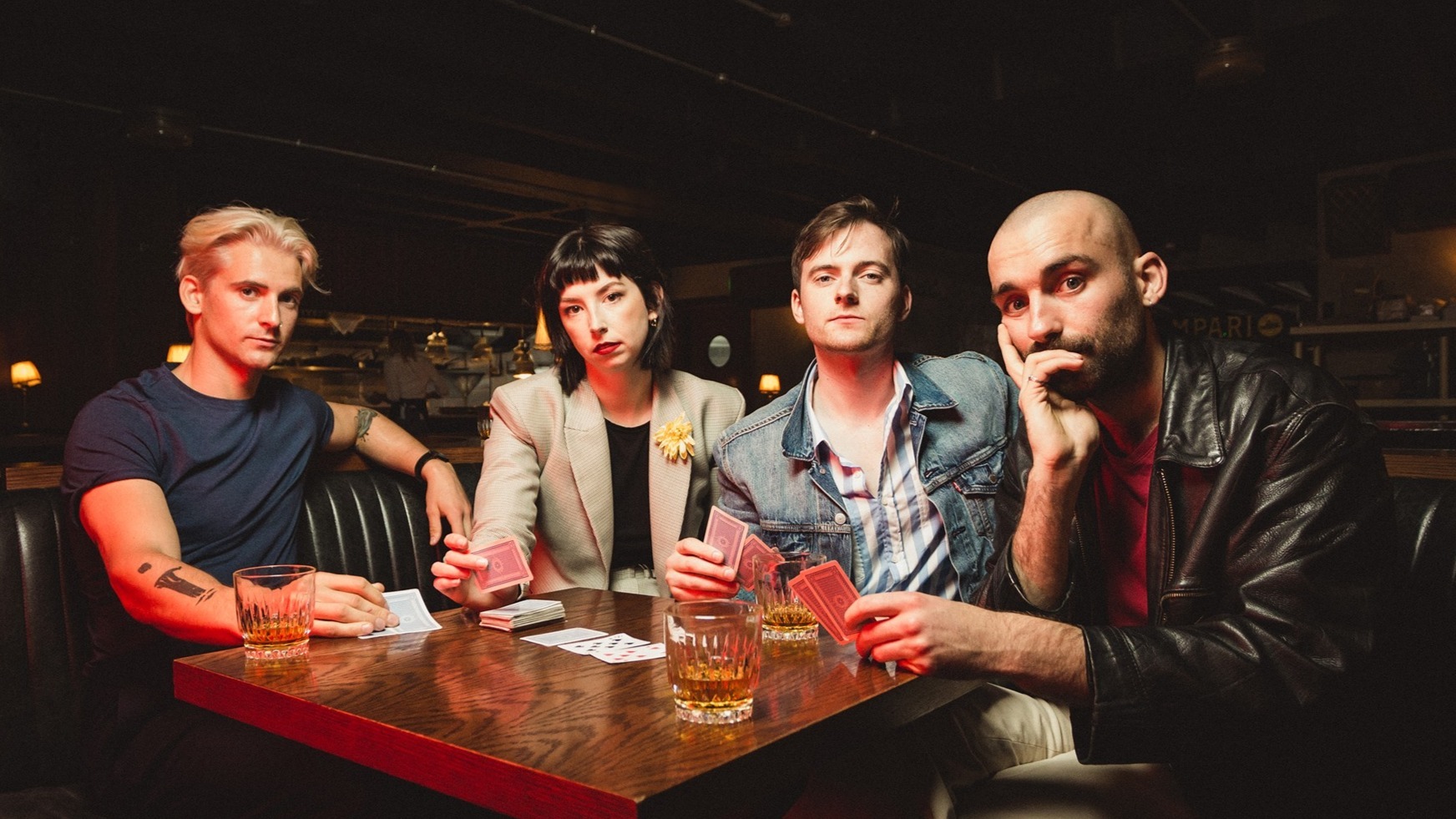
What has your experience been like introducing yourselves to your own local community? How has that felt?
Adam O’Regan: It’s been great. As I said before, it was obviously, it was a big step and a big leap to kind of make a transition from a previous thing that had had so much success. And we had a very loyal following here in Ireland and in Dublin. And so kind of like there was always this fear whether they’re going to embrace this new project. But they have, like, they wholeheartedly have. And that’s been great, and I think that it definitely… I don’t think any of us really thought it possible that we could make the transition from something that was very much a thing, if you know what I mean? In this kind of realm, and kind of make a transition into this realm, where the Blonde, have very different types of fans and very different types of music. And I feel like we have actually done that. Listen, I think if nothing comes of this and this album comes out, or whatever, I’m proud of that. I’m proud that we’ve been able to transition from one project and make an artistic statement – that’s an achievement in my books. I don’t know if that answered the question really, but… Yeah, everyone’s great. Everyone has been great. We’re feeling the love back here, and we just can’t wait to play a show. We’ve got a tour coming up in the UK and Ireland, at the end the summer. All things going well, and it’s gonna be amazing.
Donagh Seaver O’Leary: It’s gonna feel like when World War II ended, people on the streets… I’m not even joking, I think live shows are gonna take on this magical quality, because the people have been starving for so long… And it’s gonna reflect on the performances of everyone who is playing, including us.
Who are some of your favorite local up-and-comers who you've been listening to or tapped into lately?
Faye O’Rourke: I mean, we’ve gotta say Cmat. I think she’s doing great things. I think she’s a very talented song writer and comedian really. Loads… The list is kind of endless. Kean Kavanagh, I’m a huge Kean Kavanagh fan, Mondula. I’m really getting into the Pillow Queens at the moment.
Adam O’Regan: I’m loving Junior Brother as well. There’s loads of great music right now in Ireland.
It's always a pleasure to speak with you and it's so fun to see you all sitting here, all smiles, together once again, which is such a long time coming. Closing out, what do you hope listeners take away from this album and what have you taken away from creating it and now putting it out?
Adam O’Regan: I don’t think we can answer that question really. At this point, we’ve done everything we could do to create something that is meaningful for us and that we feel passionate about, and this is the part of the process where you let go of it and it’s up to everyone else to do what they can. To decipher it, to take meaning from it. I think we’re just really excited to hear what those things are.
Faye O’Rourke: Yeah, and be in other people’s lives, be inserted into other people’s lives, especially coming out of the year we’ve had, it’s just exciting to connect with people and not even know about it. It’s all the same. You see all these stats and statistics and they’re just kind of a mirage. You usually don’t even understand or you’ll never understand what those things mean.
Donagh Seaver O’Leary: And it’ll make sense once the live shows start happening. It’ll makes sense even more, I think, especially for the songs that we haven’t… We were lucky enough to play “Terrible Hands” at shows when that was released. “Swimming” was released but so much of our favorite music hasn’t been released yet, so that’s always so exciting when you actually play those and people kind of relate.
— —
:: stream/purchase Small Talk here ::
— — — —

Connect to Soda Blonde on
Facebook, Twitter, Instagram
Discover new music on Atwood Magazine
? © Ste Murray
:: Soda Blonde ::

